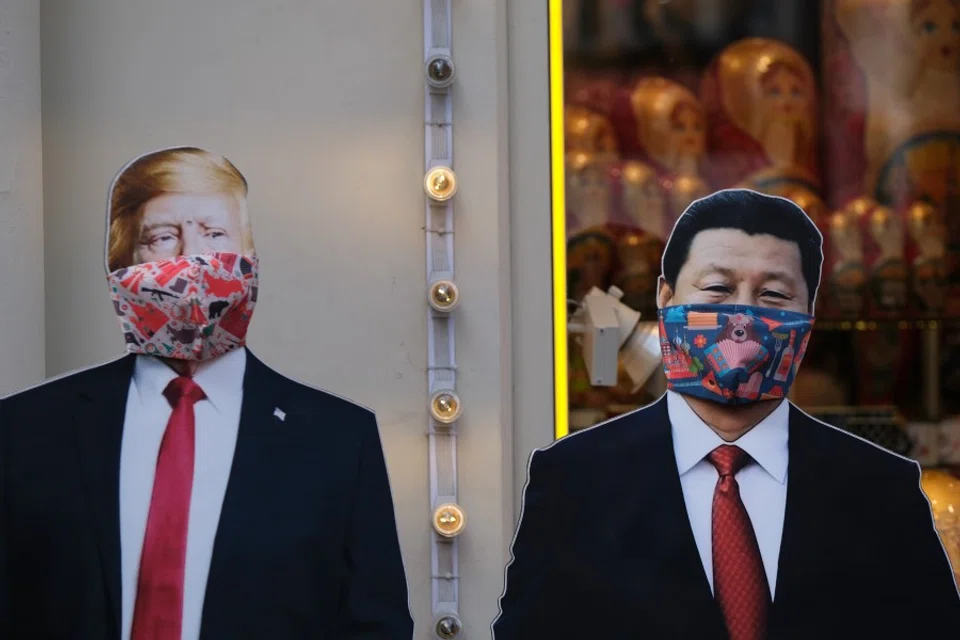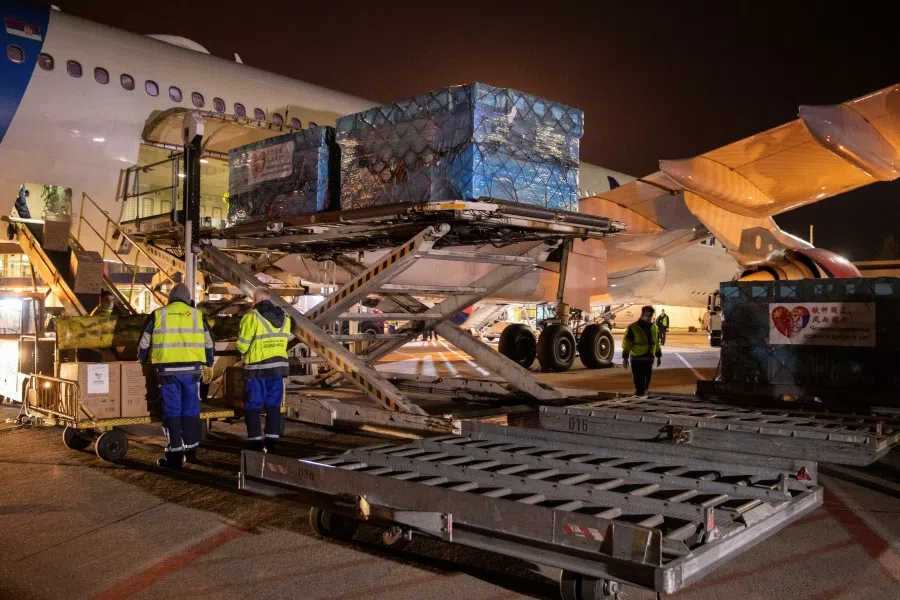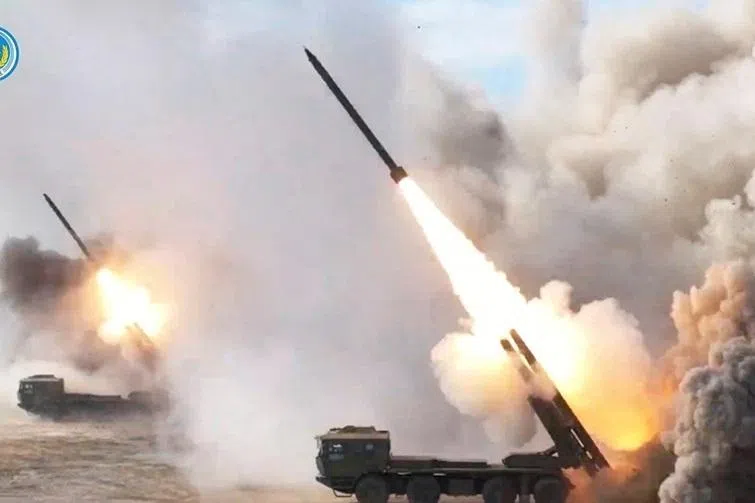China raises its international game with 'pandemic diplomacy' in Europe
While China has been diligently making hay while the sun shines, so to speak, in conducting "pandemic diplomacy", experts assess that its relations with countries in Europe will improve but the US will still hold on to its dominance in the international arena.

With an absence of US leadership in the efforts to halt the Covid-19 pandemic spread in Europe, China has launched a raft of "pandemic diplomacy" initiatives focusing on the export of medical supplies and experience. However, academics say that although China is helping many countries in Europe on an unprecedented scale, which will raise its international standing in global public health management, it will not be able to replace the US.
According to the website of the Chinese foreign ministry, China has provided supplies such as test kits, masks, and medical suits to 82 countries, including countries in Europe such as Italy, France, Spain, Greece, and Serbia.
At a regular daily press briefing last Friday, Chinese foreign ministry spokesperson Geng Shuang said the Chinese central government and several local governments have sent medical supplies to Italy, which has been hit hard by the Covid-19 outbreak. China has also sent two groups of medical experts there, with the third group preparing to leave. The Silk Road Fund will also donate 20,000 N95 masks and 20,000 test kits to Italy, and the first batch has already arrived.
"It is a positive contribution to global public health and safety, which embodies the responsibility of a big country, while being in line with China's advocated concept of building a community with a shared future for mankind." - Geng Shuang
On 23 March, Geng also said that China's local governments have sent medical supplies to the local governments of 19 countries, including Bulgaria, France, Germany, Italy, and Switzerland. Last Friday, China's foreign ministry, National Health Commission, and the General Administration of Customs held a video conference with 19 countries in the Eurasia and South Asia regions on China's efforts against Covid-19.

Geng said, "China is doing this in firm support of the international fight against the outbreak. It is a positive contribution to global public health and safety, which embodies the responsibility of a big country, while being in line with China's advocated concept of building a community with a shared future for mankind."
Xi had also phoned France, Germany, Spain, and Serbia to send his regards.
On 16 and 17 March, Chinese President Xi Jinping spoke on the phone with Italian Prime Minister Giuseppe Conte and Spanish Prime Minister Pedro Sánchez. And on 23 March, he spoke with British Prime Minister Boris Johnson and French President Emmanuel Macron, expressing willingness to provide epidemic support and assistance to Britain and France.
Last Saturday, Chinese media reported that Xi had also phoned France, Germany, Spain, and Serbia to send his regards.
"Unprecedented" assistance to Europe
Professor Li Mingjiang of the S. Rajaratnam School of International Studies (RSIS) at Nanyang Technological University described such assistance and contact as "unprecedented", adding, "This is the largest effort ever."
China clearly wants to use this chance to strengthen cooperation with European countries and enhance political ties - Prof Li Mingjiang, NTU
He said the US has not played a leading global role in the outbreak, which has given China a chance for a diplomatic breakthrough with Europe. "To some degree, China is aware of this, and is using this opportunity," he added.
Prof Li said China clearly wants to use this chance to strengthen cooperation with European countries and enhance political ties, "otherwise it would not put so much effort into providing assistance". He thinks that China's assistance will boost its bilateral ties with these European countries, depending on how long the outbreak lasts in Europe and how reliant these countries are on China's assistance, as well as whether China and Europe can resolve differences in areas such as ideology and multilateral global economic management.
However, it will not take the place of the US, because the US still has the edge over China in terms of technology and political influence in the international community. - Prof Li

During the phone conversation with Johnson, Xi reiterated support for global multilateralism, noting that countries have to promote cooperation within the UN and G20 frameworks, support the World Health Organisation in playing the role it should, improve global health management, strengthen coordination of macroeconomic policies, and ensure an open, stable, and secure global supply chain.
Prof Li said China's emphasis on multilateralism in recent years is not in line with the Trump administration and has won international support, including from Europe, which is a useful diplomatic tool for China. He predicts that China will use this outbreak to significantly enhance its role in the multilateral framework in the area of global health management. However, it will not take the place of the US, because the US still has the edge over China in terms of technology and political influence in the international community.
Note:
Taiwan has been drawn into the tussle between Beijing and Washington, with US Department of State spokesperson Morgan Ortagus and Chinese foreign ministry spokesperson Hua Chunying exchanging tweets since 19 March. Ortagus has said China covered up the Covid-19 outbreak and withheld information, while Hua has refuted the claims.
On 24 March, Ortega tweeted: "Dec. 31 -- that's the same day Taiwan first tried to warn WHO of human-human transmission. Chinese authorities meanwhile silenced doctors and refused to admit human-human transmission until Jan. 20, with catastrophic consequences."
As of the time of publication, Hua has yet to respond to this tweet.
On 10 March, Taiwan's vice-president Chen Chien-jen delivered similar talking points in his interviews with Taiwan media. Chen has also been cited by the Financial Times saying that the WHO ignored alerts from Taiwan.
Taiwan premier Su Tseng-chang yesterday also quickly followed the US line in criticising Beijing for covering up the outbreak and implicating the whole world. Taiwan's The Liberty Times quoted him as saying that if mainland China had not covered up the outbreak, the world would have had earlier warning and the outbreak would not have been so bad.



![[Big read] When the Arctic opens, what happens to Singapore?](https://cassette.sphdigital.com.sg/image/thinkchina/da65edebca34645c711c55e83e9877109b3c53847ebb1305573974651df1d13a)

